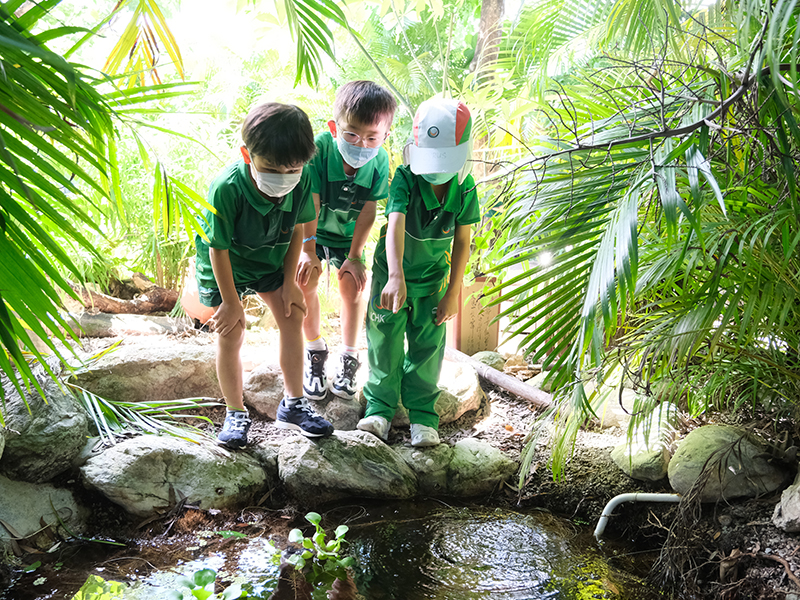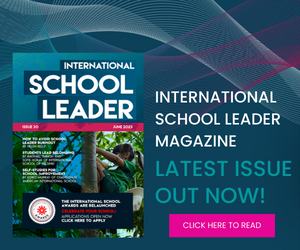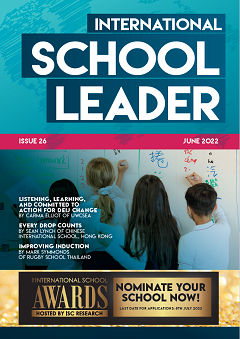By Derek Pinchbeck
As with many international schools, International College Hong Kong – Hong Lok Yuen (ICHK-HLY) is located in a city famed more for its dramatic urban environment than its nature. However, in reality, over 70% of Hong Kong remains undeveloped. The challenge for our school, therefore, is how do we enthuse our children with the knowledge about, and love of, nature that will get them exploring their own natural world and also light in them the desire to protect and sustain it?
ICHK-HLY is a kindergarten and primary school that has the good fortune of being set in the New Territories of Hong Kong and the advantage of having a semi-rural setting, large grass field and outdoor spaces. It was for the redevelopment of these outdoor areas that we were honoured to win the 2023 International Schools Award for Sustainability. Inspirational to our thinking was the view wonderfully encapsulated by a quote from David Suzuki: “Unless we are willing to encourage our children to reconnect with and appreciate the natural world, we can’t expect them to help protect and care for it.”
This belief was at the heart of our thinking when we set out to redevelop and enhance our outdoor spaces. We had previously developed a wooded area with an outdoor classroom and where students can practise outdoor skills such as fire lighting, tree climbing and slacklining.
Planting a forest
Seeking to inspire more appreciation of the natural world, we made the decision to become the first school in Hong Kong to plant a Miyawaki Forest in an unused area at the end of our field. The Miyawaki method of planting is designed to promote the speed of growth via dense planting of trees. This means that a forest will reach maturity in approximately four to five years. It appealed to our thinking as it allowed a disused area at the end of our field to quickly be rewilded.
A vital component in our thinking was to provide transferability of knowledge for students. Our aim was that, as our children grow and explore more of Hong Kong’s countryside, they will come across the same plants they had grown to love in the school grounds. We therefore made sure that all 300-plus trees that we planted were indigenous to Hong Kong. It is our hope that engendering a love of local flora and fauna in kindergarten and primary school will mean that our students will flourish into adults who are passionate advocates for sustainability in Hong Kong and beyond.
Planting a growing and evolving ecosystem provides a deep learning context for students that will last for decades to come.
Engaging students
From the outset, it was important for us to engage the students as actively as possible in the process. Prior to planting, all students from years one to six were involved in designing and making tree tags for the individual trees. Students were then allocated a tree to care for. In workshops prior to the planting, students engaged in finding out about their tree and the conditions it required to flourish. In an ideal world, we would also have included parents in our workshops, however COVID-19 restrictions limited access to the school grounds.
Students and staff were involved in planting the forest, and workshops were then held with the students to teach them about the Miyawaki forest method and their role in helping the trees to grow via mulching, weeding and monitoring of the tree’s growth. Workshops were also held to introduce indigenous tree species to the students.
Learning from an evolving ecosystem
With the planting of a growing and evolving ecosystem the project provides a deep learning context for students that will last for decades to come. Certainly one of the unexpected learnings, both as a leader and for the students, is the appreciation of slow time. Seeing something gradually grow and evolve over years rather than weeks or months has been a great reinforcement of the need to take time in this ever busy world.
The initial phase focused on the planting, maintenance and growth of the forest. This phase is expected to last three to four years. Once the forest has become more established then the focus will be on tracking and recording the developing ecosystem that has been created. Students will track the incoming insects, birds and other creatures that the forest will attract. They will also continue to observe the impact on the temperature that the forest will create.
Importantly, the development of a sensory trail through the forest will ensure that it becomes a place where students can enter and reconnect with the natural world.
Combined with the existing wooded area this will mean that children have multiple opportunities to connect with nature onsite, both learning about and learning in nature. Explicit reference will be made to the sustainability of maintaining these areas, allowing students to move from the micro-level of first-hand experience to engaging passionately with macro-level sustainability issues.
Continual engagement with nature
The addition this year of an organic community garden has created a community area that will allow families to be part of the school’s focus on sustainability by increasing student understanding of food production. By including the whole community we will deepen the embedding of the outdoor developments as central to the mission and values of the school.
When I reflect on our process, I feel the key learning for me is that school projects which focus on sustainability and engagement with nature must reflect joined-up thinking and not stand as an isolated component of learning. When showing prospective parents the school I always say, “If you want your child to come home clean, this isn’t the school for you.” Our hands-on approach to engagement with nature is reflected in all areas. One example is our school uniform which is PE kit made from recycled plastics, giving a clear message that we want children to be active and outdoors the whole time, not just on specially designated occasions.
It is our hope that, as a result of the work we are doing, students will grow up truly loving nature and feeling empowered to act as active global citizens to protect and care for it.
Derek Pinchbeck is Head of School at International College Hong Kong – Hong Lok Yuen. Connect with Derek directly on LinkedIn




